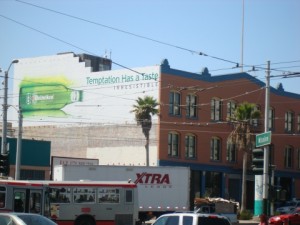The city of San Francisco has been slowly working to enforce a 2002 city proposition which banned new billboards on private property. Of course, we all know city governments are notoriously cash-strapped. So it comes as no surprise that it was only in 2007 that the city had completed a survey of the existent billboards in order to begin enforcement.
 Now, the city has three full time people working on the code-enforcement detail stopping illegal billboards. Unfortunately, San Franciscans who don’t want to be bombarded with billboards across the city-scape have a new problem to contend with… the billboard industry’s legal team.
Now, the city has three full time people working on the code-enforcement detail stopping illegal billboards. Unfortunately, San Franciscans who don’t want to be bombarded with billboards across the city-scape have a new problem to contend with… the billboard industry’s legal team.
As this article in today’s San Francisco Chronicle explains, although the city has issued citations in over 250 cases, almost none of the fines have been paid by the billboard owners.
According to city Planning Department officials, a three-person enforcement team has located more than 250 illegal billboards and sought fines against the company owners and landlords totaling about $1.5 million.
Only $50,500 of that has been collected, however, in part because the majority of the fines are tied up in unresolved legal actions.
“We’re trying to stop any new billboards from going up and finding the ones that have been put up without permits,” said Dan Sider, the city planner in charge of the program. “Outdoor advertising is a lucrative industry, so the companies are hiring very skilled lawyers who are waging legal challenges.”
It didn’t take long for the outdoor advertising industry, which handles $7.2 billion in business each year, to file legal challenges. Two cases recently argued in Los Angeles federal district court may not bode well for San Francisco. In both cases – which are now pending at the Ninth Circuit Court of Appeals – the district courts ruled that restrictions on billboards are not enforceable because they violated the Constitution.
In one case, the court ruled that Los Angeles created a double standard by restricting private advertising signs, but simultaneously sold ad space on bus shelters and other public places.
“It’s a violation of the First Amendment if the city allows some signs, but not others without justification,” said Rex Heinke, a Los Angeles attorney, who is representing a company in one of the Los Angeles cases.
I guess we’ll have to see what the Ninth Circuit Court of Appeals (also located in San Francisco) has to say about this issue. Once again the business interests fall back on the First Amendment to purportedly protect their trampling on the public’s enjoyment of a blight-free public space. Of course, the First Amendment, as any grade school kid will tell you, is the right to free speech enshrined in the Constitution. However, the right is not absolute, but rather elastic. It applies absolutely to some speech and less so to others. The most protected is political speech, while commercial speech requires much less deference. It remains to be seen how much import the judges on the Ninth Circuit will attach to visual clutter…

3 Comments
This is such a complex subject involving free speech rights and private property/ownership issues that it could very well drag on for years.
I would’nt be surprised if it does’nt go all the way to the Supreme Court.
Is this law a joke? This is exactly what the first amendment was designed to protect.
Um, no, the First Amendment was not designed to protect the advertising industry, it’s the individual’s right to free speech/expression against action by the state. And these individual’s who are in these communities state they don’t want billboards messing up their environment, they are exercising that freedom.